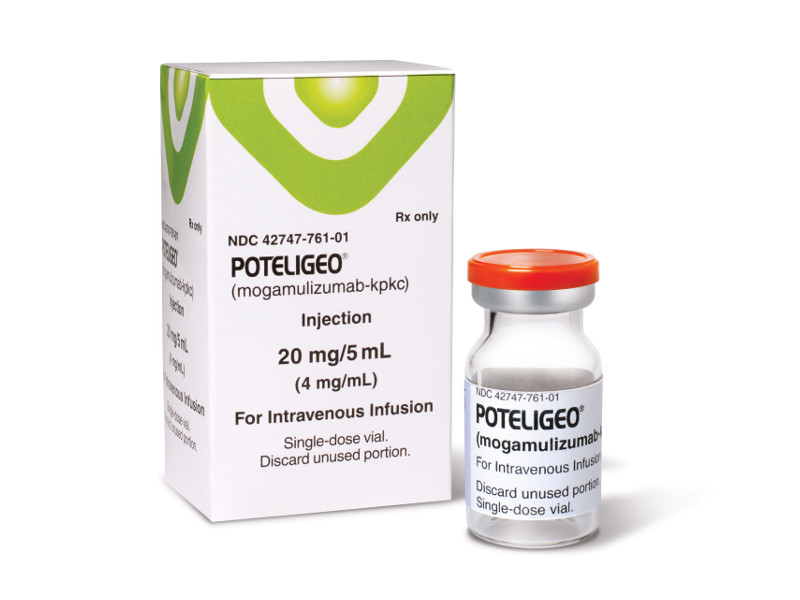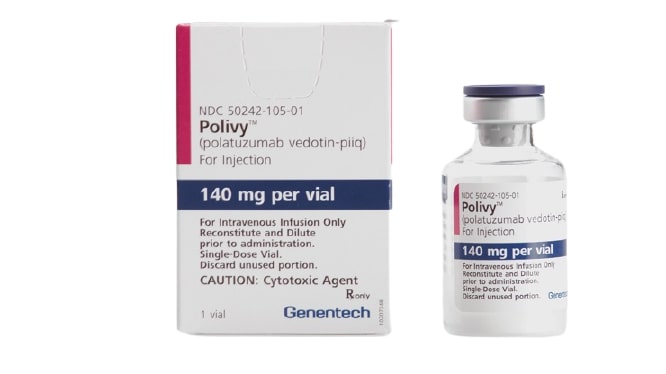Poteligeo (mogamulizumab) vs Polivy (polatuzumab vedotin-piiq)
Poteligeo (mogamulizumab) vs Polivy (polatuzumab vedotin-piiq)
Poteligeo (mogamulizumab) is a monoclonal antibody used for the treatment of adult patients with relapsed or refractory mycosis fungoides (MF) or Sézary syndrome (SS), which are types of cutaneous T-cell lymphomas, after at least one prior systemic therapy. Polivy (polatuzumab vedotin-piiq), on the other hand, is an antibody-drug conjugate indicated for the treatment of adult patients with relapsed or refractory diffuse large B-cell lymphoma (DLBCL), in combination with bendamustine and a rituximab product, after at least two prior therapies. When deciding between the two, it is essential to consider the specific type of lymphoma being treated, as Poteligeo is not indicated for DLBCL, and Polivy is not used for MF or SS, along with the patient's previous treatments and overall health profile.
Difference between Poteligeo and Polivy
| Metric | Poteligeo (mogamulizumab) | Polivy (polatuzumab vedotin-piiq) |
|---|---|---|
| Generic name | Mogamulizumab | Polatuzumab vedotin-piiq |
| Indications | Relapsed or refractory mycosis fungoides or Sézary syndrome | Relapsed or refractory diffuse large B-cell lymphoma |
| Mechanism of action | CCR4-directed monoclonal antibody | CD79b-directed antibody-drug conjugate |
| Brand names | Poteligeo | Polivy |
| Administrative route | IV infusion | IV infusion |
| Side effects | Rash, infusion reactions, fatigue, diarrhea, musculoskeletal pain | Neutropenia, thrombocytopenia, anemia, peripheral neuropathy, fever |
| Contraindications | Hypersensitivity to mogamulizumab or any of its excipients | Hypersensitivity to polatuzumab vedotin-piiq or any of its excipients |
| Drug class | Monoclonal antibody | Antibody-drug conjugate |
| Manufacturer | Kyowa Kirin Co., Ltd. | Genentech, Inc. |
Efficacy
Efficacy of Poteligeo (Mogamulizumab) for Lymphoma
Poteligeo (mogamulizumab-kpkc) is a monoclonal antibody that has been approved by the U.S. Food and Drug Administration (FDA) for the treatment of adult patients with relapsed or refractory mycosis fungoides (MF) or Sézary syndrome (SS), which are types of cutaneous T-cell lymphoma (CTCL). The efficacy of Poteligeo was primarily demonstrated in a pivotal clinical trial known as the MAVORIC study. This trial showed that Poteligeo significantly improved progression-free survival (PFS) compared to vorinostat in patients with relapsed or refractory MF and SS. The median PFS was 7.6 months for patients treated with Poteligeo compared to 3.1 months for those on vorinostat, highlighting its potential as a therapeutic option for this patient population.
Efficacy of Polivy (Polatuzumab Vedotin-piiq) for Lymphoma
Polivy (polatuzumab vedotin-piiq) is an antibody-drug conjugate that targets CD79b, a protein expressed on the surface of B cells, and is conjugated to a cytotoxic agent. It is approved for use in combination with bendamustine and a rituximab product (BR) for the treatment of adult patients with relapsed or refractory diffuse large B-cell lymphoma (DLBCL), not otherwise specified, after at least two prior therapies. The approval of Polivy was based on a randomized, controlled clinical trial that demonstrated a significant improvement in complete response rates and overall survival when added to BR. Patients treated with the Polivy combination showed a complete response rate of 40% compared to 17.5% for those treated with BR alone.
Both Poteligeo and Polivy represent advances in the treatment of different types of lymphoma, addressing the need for new therapies in the relapsed or refractory setting. Their approvals were based on the demonstration of improved outcomes in clinical trials, offering additional options for patients who have limited treatments available. As with all medications, the use of Poteligeo and Polivy should be individualized based on the patient's specific condition, and they should be administered under the guidance of a healthcare professional experienced in the treatment of cancer.
It is important to note that while these medications have shown efficacy in their respective indications, they are not cures for lymphoma. Patients and healthcare providers should discuss the potential benefits and risks of these treatments, and consider them within the broader context of the patient's treatment plan and prognosis.
Regulatory Agency Approvals
Poteligeo
-
European Medical Agency (EMA), European Union

-
Food and Drug Administration (FDA), USA

-
Therapeutic Goods Administration (TGA), Australia

Polivy
-
Food and Drug Administration (FDA), USA

-
Pharmaceuticals and Medical Devices Agency (PMDA), Japan

-
Therapeutic Goods Administration (TGA), Australia

Access Poteligeo or Polivy today
If Poteligeo or Polivy are not approved or available in your country (e.g. due to supply issues), you can access them via Everyone.org.
How it works

Make an enquiry
Choose the medicine you want to buy, answer a couple of questions, and upload your prescription to speed things up. We’ll get back to you within 24 hours.


Make an enquiry
Choose the medicine you want to buy, answer a couple of questions, and upload your prescription to speed things up. We’ll get back to you within 24 hours.


Breeze through the paperwork
We'll guide you through the required documents for importing unapproved medicine, ensuring you have all the necessary information.


Get a personalized quote
We’ll prepare a quote for you, including medicine costs and any shipping, administrative, or import fees that may apply.


Receive your medicine
Accept the quote and we’ll handle the rest - sourcing and safely delivering your medicine.

Some text on this page has been automatically generated. Speak to your physician before you start a new treatment or medication.
Let's talk
If you have any questions, call us or send us a message through WhatsApp or email:
Contact us




